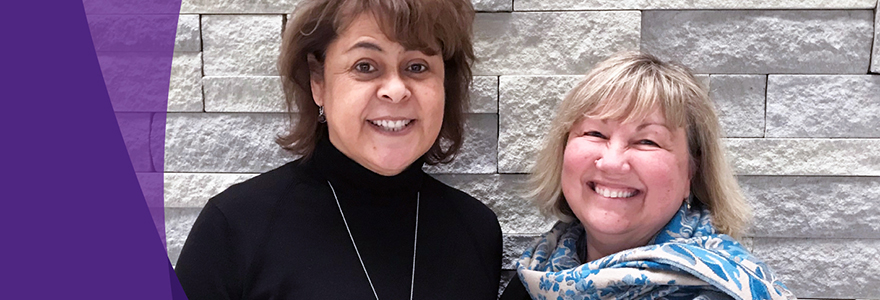
Professor Jan Hare and Professor Kathy Hibbert.

Professor Jan Hare and Professor Kathy Hibbert.
Canada’s Truth and Reconciliation ‘Call to Action’, stressed that educational institutions would be key to reconciliation because of “what they have taught, or failed to teach over many generations… Education must remedy the gaps in historical knowledge that perpetuate ignorance and racism” (TRC, 2015, p. 285). Western’s Faculty of Education takes this call to action seriously. Together - Professor Brent Debassige (Director, Aboriginal Education), Professor Erica Neeganagwedgin, (Assistant Professor, Critical Policy, Equity and Leadership Studies) and Professor Kathy Hibbert (Professor and Associate Dean, Teacher Education) began to plan a series of actions that we could take to acknowledge The Teacher Education program as a ‘critical site’ for reconciliation.
One of those steps was to invite collaboration with Indigenous and non-Indigenous scholars to walk this path alongside us. We were delighted to host Professor Jan Hare, an Anishinaabe scholar and educator from the M’Chigeeng First Nation located in northern Ontario, for a week to work with our Teacher Education program. Professor Hare, currently serving as Associate Dean, Indigenous Education at the University of British Colombia, works to improve educational outcomes for Aboriginal/Indigenous learners by centering Indigenous knowledge systems within educational reform.
During her visit, Professor Hare worked with 700 Teacher Candidates; sharing the Indigenous tradition of storytelling, helping them understand the role stories play - and how to integrate this tradition into their classrooms respectfully and meaningfully. To consolidate this message, we hosted a workshop for all Faculty of Education instructors. Faculty were invited to bring their course outlines and materials to the session, and review their syllabi for opportunities to include Indigenous perspectives and consider whether they were expanding learning or challenging the dominant or privileged paradigm reflected in their courses.
Finally, Professor Hare presented an open seminar on the topic, “Reconciliation In/Through Teacher Education.” Professor Hare describes the situation as follows:
Introducing reconciliation in/through teacher education assumes that, by engaging students of all backgrounds in the theory and practices of Indigenous education, they will have a greater historical awareness of Canada’s shared colonial history and engage in respectful relationship building between Indigenous and non-Indigenous peoples. In turn, these education students’ ability to embed Indigenous perspectives and content in their practice will be enhanced in ways that extend their teaching skills and sense of professionalism. A good part of this consolidation strategy will depend on how reconciliation is understood by pre-service teachers in terms of pedagogies and practices.
This very successful visit has provided an opportunity for our faculty and staff to participate in ways to create, as Professor Hare advises, “a safe space for Indigenous students that empowers them to further their journeys of resurgence and self-determination, and to help non-Indigenous teacher candidates understand their role in that journey.” Professor Hare had stressed that this was not going to be a smooth process, but that it was better to take steps with an open mind and heart, recognizing that it may be uncomfortable at times, and that we may make mistakes along the way as we learned together.
Katie Jacobs, a first year Teacher Candidate in the Primary Junior stream summed it up in her comments following the session: “I really enjoyed how Jan encouraged us to engage in decolonizing pedagogies even if we aren’t 100% comfortable with the content.”